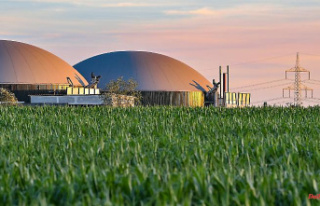Corona, war in Ukraine, energy crisis - the German economy is under constant stress. Before one setback is overcome, the next follows. Economic expectations are correspondingly pessimistic. The mixed situation reveals one thing above all: the naivety of the economic model.
Four years ago, the unusually dry summer was still one of the main reasons for weaker economic growth. According to calculations by the Kiel Institute for the World Economy, the low water at that time alone caused economic output to shrink by 0.2 percent. This year, however, the drought is only a sideshow. Not because the effects would be weaker, but because the country is being overwhelmed by several economic problems.
The energy crisis, the war in Ukraine and some of the aftermath of the Corona crisis are taking their toll on the economy. The prospects are also bad. The economic expectations, which the Mannheim Center for European Economic Research (ZEW) collects monthly with a survey, are currently at their lowest level for eleven years. But why are expectations so bad, and how could they get better again?
Anyone who now only blames the war in Ukraine for the problems is far from it. Because the bleak prospects only arose because the problems have accumulated in recent months and years and can only be solved slowly.
First of all, there are the aftermath of the Corona crisis: last year and at the beginning of the year, economic researchers expected that the global supply bottlenecks would soon resolve. Since many companies have full order books, the end of the supply bottlenecks would have ensured a significant increase in production.
However, according to the Munich Ifo Institute, almost three quarters of German companies still suffer from material shortages. "For the next few months there are no signs of a significant recovery in the procurement of important materials," says Klaus Wohlrabe, head of the Ifo surveys. Instead, the current low water is likely to exacerbate the material shortage for some companies.
Rising energy costs have added to this misery in recent months. The procurement of gas has now become so expensive that many companies can no longer produce economically. According to a survey by the German Chamber of Industry and Commerce (DIHK), one sixth of German industrial companies expect to cut back or stop production. "Even in the medium term, gas will no longer be as cheap as it used to be," said economics expert Veronika Grimm recently in an interview with "Capital". So it is uncertain how the industrial production of many energy-intensive sectors, such as the chemical industry, the glass sector or the steel sector, will continue.
In addition, the Germans themselves could slow down the upswing in their country in the future. Because while many Germans felt the higher energy prices at the gas station in the spring, they will also see them on their utility bills in the coming months. Inflation is already at 7.5 percent. The gas allocation has just been decided. Further price increases will almost certainly cause many people to consume less and thus further take the wind out of the economy's sails.
Above all, the mixture of supply bottlenecks, high gas prices and the Ukraine war has revealed that the entire German economic model of the past decades has been characterized by naivety. For too long, the country has relied on world trade functioning properly, cheap imports of energy and inputs remaining available in the long term, and companies being able to continue exporting to growing foreign countries. So if the economy is to pick up again, the country will have to change.
You can read how this can be done at Capital or in the new issue of "Capital": A new business model formulated in 5 theses.












